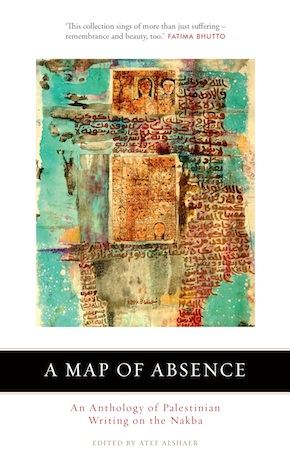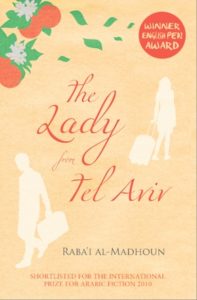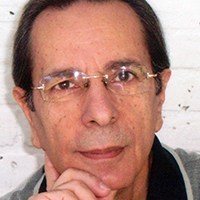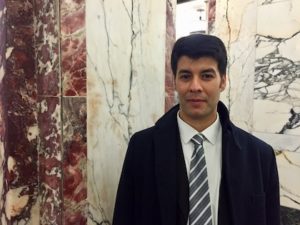Flight to Gaza
by Raba'i al-Madhoun
“An essential collection of vital voices.” Bidisha
My seatmate goes on talking as if we come from the same country. As if we share the same fears, the same constellations of film stars. As she recounts stories about the festival, my mind recalls televised scenes of the war – the live coverage of American attacks that sowed democracy across Iraq. The tonnes of ordnance that went into ploughing deep furrows across the burning old fields of despotism.
I let her talk and wander off in my mind to Asqalan, where her boyfriend plays basketball. Majdal Asqalan is where the protagonist of my novel is from. His whole family is from there. If he, Adel El-Bashity could hear what she is saying, he would shout: “If only our conflict took place in stadiums! If only the shots fired were at goals, not on people, we would have already founded a Democratic State of Football that stretched from the Mediterranean to the Jordan River, and there would be enough room for all footballers to live there in peace and harmony!” Sometimes Adel’s optimism seems ridiculous to me, and it makes me chuckle to imagine that even football could peacefully coexist between the two sides in the foreseeable future. It would be more like El Salvador and Honduras in the 1969 World Cup qualifiers – when football led to war.
She stops talking, and I don’t want to interrupt the silence. But she turns to me though realising only now that she has gone on too long or shared too much. Coyly, she asks, “I’m sorry – where did you say you were from?”
The question surprises me. From the moment I sat down in my seat until the moment she asks the question, it has been bothering me. At first I am nervous, too unsettled to choose an answer. I could say, for instance, that I am Greek or Cypriot or Lebanese, or anything. I could pick any other nationality – anything but Palestinian. I am afraid someone might overhear and shout out: “Palestinian! This man’s a Palestinian!” What if someone got up and made a public announcement, “Ladies and gentlemen: please be advised that there is a Palestinian on board!”
‘Aha. A Palestinian, huh?’ she says. It is as if I had tried to put one over on her, or my answer is not good enough. She plays with a strand of her hair…”
If this had been my seatmate’s first question, I might not have answered it. But now, after getting to know each other, I am not in a position to ignore her. Whatever apprehensions I may have, they belong to the past. Still, I decide to play dumb. “Where am I from? You never asked. You never asked.”
“No, I’ve asked you twice now.” And then wryly, she repeats it again.
“I am Palestinian. I have British citizenship, but I am Palestinian.”
“Aha. A Palestinian, huh?” she says. It is as if I had tried to put one over on her, or my answer is not good enough. She plays with a strand of her hair. Under the faint overhead light, it has lost most of its golden sheen.

“Takes you to the height of reading pleasure.” Elias Khoury
Flatly, even coldly now, she asks, “Are you taking a tour of Israel?”
“No, I am visiting family in Gaza.”
“Gaza?” She actually gasps as she says it.
“Yes. Gaza.”
She stops playing with her hair and turns toward the window to hide her reaction. She rests her chin on her hand and stares out. The window has now turned into a small black mirror that casts shadows over things we may think but cannot see. All around us the jet engines hum in a din so constant it sounds like nothing.
My seatmate turns away from her mirror and asks in a trembling voice: “Do you often visit Gaza?”
“Not at all. This will be my first trip in thirty-eight years. The truth is that I haven’t seen my mother in that long.”
She blots upright in her seat. “My God! Thirty-eight years! How have you managed to stay away from your mother and family all these years? You’re not a negligent son, are you? You don’t look cruel, but… I’m sorry for your mother.”
“The occupation is what’s cruel. Not me…”
She does not comment. I begin to rattle on as my bitterness gets the better of me, “I haven’t been able to go back since 1967. I was not allowed to go back.”
“Of course, of course. I hadn’t thought of that. I am really sorry. It hadn’t occurred to me that you were unable to visit… Gaza, huh?”
“Yes. I’m going there with my new British passport. I just got it. Without it, I couldn’t go via Tel Aviv.”
For some unknown reason, I begin to tell her my life story. She listens with interest and curiosity. She watches me without interrupting or saying a word, her head propped in the gap between our seats. She studies me as if I were spinning a fantastic yarn.
“I was born in 1948, in Asdud. In the place you now call Ashdod. My family left during the war, went to Gaza, along with so many others from southern Palestine. We fled there and settled. I spent my childhood and youth in the camps of Khan Yunis. I was educated in Gaza all through secondary school. When I finished, I went to study at Cairo University. After graduating, I wandered the world, a refugee standing on his own two feet – though one was made of exodus without end, and the other a journey without destination. I collected my exiles one by one, I labelled them according to the numbers of years I lived in each. I watch history in our part of the world and notice that it weighs our existence on a broken scale. For every Jewish immigrant to Israel, a dozen Palestinians are driven out.” Then I add: “If it seems lopsided, it’s because the scale that measures us has never been balanced.”
I’d love to answer her with a simple quote from Mahmoud Darwish: get out. Leave our lands. Evacuate our territories and quit our sea… I say none of this to her.”
My seatmate takes refuge in silence. She does not put up any resistance to my last attack, which, in any case, was not one I had planned to make. Instead, she sends whatever anxiety she is feeling out into the night sky. She studies herself in the blank mirror. At the same time, her hand creeps over and gently clasps mine.
Returning from her distant musings, she twists to face me. Her fingers send warmth across my hand. “I hope you have no delays in seeing your mother and that you have a good time together. I hope that there can be peace between us and the Palestinians. We’re tired of the situation, all of us. The problem is not the people, it’s the politicians. Our politicians and yours. Sharon doesn’t want peace, nor does Arafat. As she speaks, she retracts her hand and shifts her weight onto the forearm that rests between our seats.
The extremists on your side and the extremists on ours. They always say that when they want to parse the crime and reapportion blame for the shedding of Palestinian blood. Your extremists and our extremists. Fine. I’d love to answer her with a simple quote from Mahmoud Darwish: get out. Leave our lands. Evacuate our territories and quit our sea. Get out of our wheat, our salt, our wounds. Leave the vocabulary of our memory. Then – and only then – can you take care of your extremists while we take care of ours.
I say none of this to her. What is the use of dredging up the entire Middle Eastern conflict in a fleeting meeting between two strangers sitting next to each on a flight? When I do talk, I say something else entirely: I tell her that I hope Palestinians and Israelis might leave the battlefield behind them and learn to share a life together. I hope that one day she and I might walk together along a long road with no checkpoints between us. No assassinations and no suicide bombers, no soldiers and no militants, no Zionism and no Palestinian national liberation, no Intifadas and no settlements, no Sharons and no Arafats, no Abu Mazens and no Shaul Mofazes, no warlords, no settlers, no Apache helicopters, no F-16s and no car bombs. I hope that we could be just two regular passengers passing the night on any flight…
From The Lady from Tel Aviv, translated from Arabic by Elliott Colla. Extracted from A Map of Absence, edited by Atef Alshaer
 Raba’i al-Madhoun was born in al-Majdal, Palestine in 1945 and now lives and works in London as a writer and an editor at the leading Arabic daily, Asharq al-Awsat. The Lady from Tel Aviv was shortlisted for the 2010 International Prize for Arabic Fiction, and won the English PEN Writers in Translation award in the same year. His other works include The Idiot of Khan Younis, The Taste of Separation and Destinies: Concerto of the Holocaust and the Nakba, for which he won the International Prize for Arabic Fiction 2016. The Lady from Tel Aviv is published by Telegram.
Raba’i al-Madhoun was born in al-Majdal, Palestine in 1945 and now lives and works in London as a writer and an editor at the leading Arabic daily, Asharq al-Awsat. The Lady from Tel Aviv was shortlisted for the 2010 International Prize for Arabic Fiction, and won the English PEN Writers in Translation award in the same year. His other works include The Idiot of Khan Younis, The Taste of Separation and Destinies: Concerto of the Holocaust and the Nakba, for which he won the International Prize for Arabic Fiction 2016. The Lady from Tel Aviv is published by Telegram.
Read more
Elliott Colla is a prominent translator of modern Arabic fiction, including novels by Ibrahim al-Koni, Ibrahim Aslan and Idris Ali. He is the author of Conflicted Antiquities: Egyptology, Egyptomania, Egyptian Modernity and the thriller Baghdad Central, which is in production by Euston Films for Channel 4. He currently teaches Arabic literature at Georgetown University, Washington, DC.
elliottcolla.com

Atef Alshaer is a lecturer in Arabic Studies at the University of Westminster. He was educated at Birzeit University in Palestine and the School of Oriental and African Studies, University of London, where he obtained his PhD and taught for a number of years. His other publications include Poetry and Politics in the Modern Arab World and Love and Poetry in the Middle East (C. Hurst & Co., October 2019).
A Map of Absence: An Anthology of Palestinian Writing on the Nakba presents the finest poetry and prose by Palestinian writers over the last seventy years, including excerpts of works by major authors such as Mahmoud Darwish, Ghassan Kanafani and Fadwa Tuqan alongside those of emerging writers published in English for the first time.
Read more
@SaqiBooks

